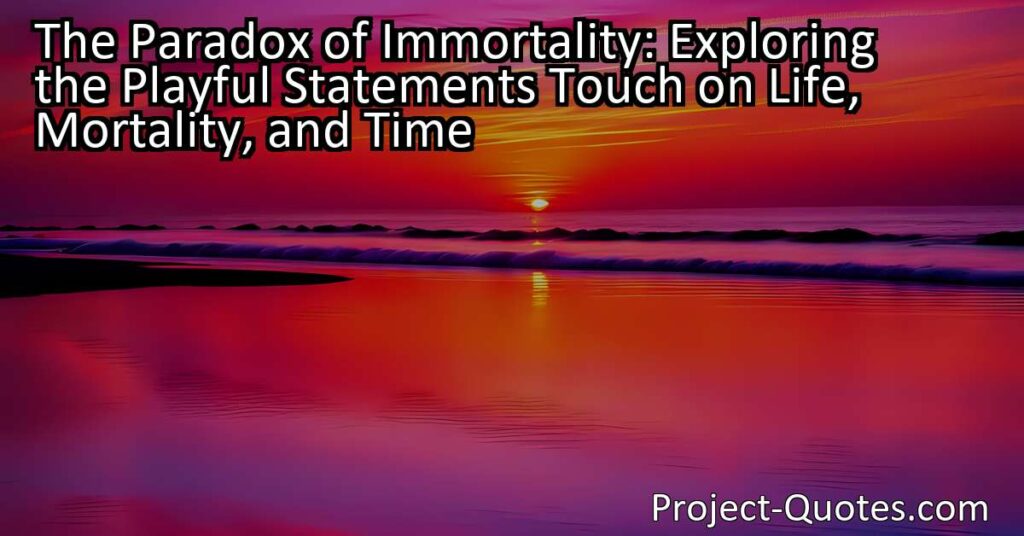I intend to live forever. So far, so good.
Steven Wright
The Paradox of Immortality: Exploring Life, Mortality, and Time through a Playful Statement In this thought-provoking exploration of immortality, Steven Wright’s lighthearted remark, “I intend to live forever. So far, so good,” invites us to consider the paradox of our mortal existence. Through humor, he subtly acknowledges the fragility of life, the fear of the unknown, and the ethical dilemmas that arise when contemplating eternal life. Ultimately, his playfulness encourages us to cherish the fleeting moments we have and to find meaning in the brevity of our mortal lives.
Table of Contents
Meaning of Quote – I intend to live forever. So far, so good.
Have you ever contemplated the idea of immortality? Imagining a life without end, where time stretches out indefinitely, can be both intriguing and daunting. It is a concept that has fascinated writers, philosophers, and dreamers for centuries. Steven Wright, a master of deadpan humor, once stated, “I intend to live forever. So far, so good.” While his words may appear lighthearted, they hold a deeper meaning that encourages us to ponder the nature of life, mortality, and the fleeting passage of time.
When Wright jests, “So far, so good,” he subtly acknowledges the irony of the statement. As humans, we are well-acquainted with the inevitability of death. Our mortal existence is characterized by its finite nature, which makes the desire for immortality all the more compelling. By highlighting the contradiction between his intent to live forever and the impossibility of achieving such a feat, Wright slyly explores the fragility of our mortal existence.
In contemplating the concept of immortality, we inevitably confront our own mortality. It is the very finiteness of life that gives it meaning and purpose. Knowing that our time is limited urges us to appreciate the precious moments we have, to live life to the fullest. If we were immortal, would we still cherish each day? Or would life lose its luster, with time losing its significance?
Wright’s playful statement also touches upon one of humanity’s greatest fears: the fear of the unknown. Death is often viewed as a mysterious portal, leading to an uncertain realm beyond our comprehension. The idea of immortality offers solace, a shield against the fear of the unknown. It presents the possibility of escaping mortality, of continuing to exist in some form beyond the boundaries of our physical existence.
However, the pursuit of immortality raises ethical concerns. Imagine a world in which some individuals possess the gift of eternal life, while others continue to perish. It would create an imbalance, a divide between the immortal and the mortal. The question of who should be granted immortality, and on what grounds, becomes a complex ethical dilemma. Should it be a privilege for the wealthy and powerful or a right shared by all?
Moreover, immortality may have unforeseen consequences for personal growth and the human experience. Our mortality propels us to seek personal development, to learn, to create, and to contribute to society in meaningful ways. The sense of urgency brought about by the awareness of our limited time pushes us to make the most of our talents and abilities. If we were to be immortal, would we lose the motivation to develop ourselves and make a positive impact on others?
Additionally, the passage of time shapes our identities and allows us to reflect on our past, learn from our mistakes, and grow as individuals. Immortality may undermine this fundamental aspect of personal development, leaving us stagnant and unchanging. Would we truly appreciate the value of life if we could experience it indefinitely without any sense of progression or growth?
Though Wright’s quote serves as a humorous quip, it encourages us to explore the deeper questions surrounding the nature of existence. It calls us to reflect on the balance between mortality and immortality, the significance of time, and the purpose that comes from our impermanent existence. It reminds us of the beauty and brevity of life and the importance of cherishing each moment.
In the grand tapestry of existence, humans have marveled at the mystery of life and death since time immemorial. The quest for immortality has captivated our imaginations, inspiring myths, legends, and works of art. However, as we ponder the idea of living forever, it is essential to recognize the wisdom in embracing the finite nature of our existence. Life gains meaning and value precisely because it is fleeting.
Wright’s clever remark leaves us with a thought-provoking sentiment, nestled within his signature wit. If he intends to live forever and his statement holds true, then perhaps his perspective embraces a form of immortality that transcends physical limitations. The immortality of ideas, of laughter, and of the impact one can have on others is an everlasting legacy that can endure.
Ultimately, while the notion of living forever may remain a tantalizing fantasy, it is vital to appreciate the beauty and richness of each passing moment. Life, however brief, unfolds with countless opportunities for joy, growth, and love. As we navigate the ebb and flow of existence, let us savor the journey, cherishing the memories we create, and acknowledging the fleeting nature of our mortal lives.
I hope this quote inspired image brings you hope and peace. Share it with someone who needs it today!


